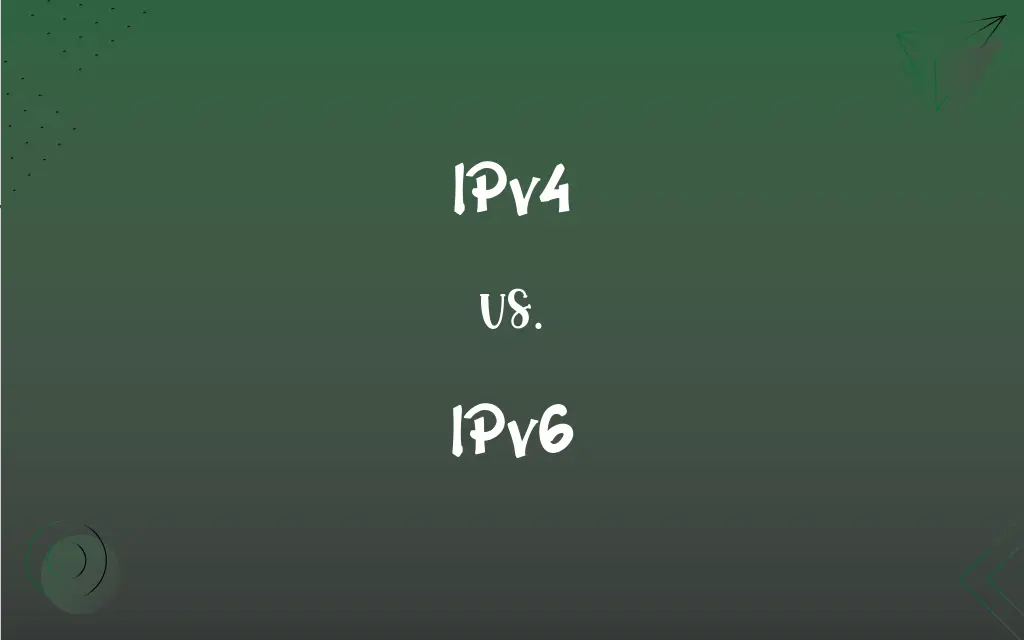IPv4 vs. IPv6: What's the Difference?
Edited by Janet White || By Harlon Moss || Updated on October 10, 2023
IPv4 is a 32-bit addressing scheme; IPv6 is a 128-bit addressing scheme. IPv6 was introduced to accommodate the explosive growth of the internet.

Key Differences
IPv4, standing for "Internet Protocol version 4," is the fourth iteration of IP addressing. Conversely, IPv6, or "Internet Protocol version 6," is the sixth and the latest version. Both are essential for routing traffic across the internet, but they serve in different capacities.
The primary distinction between IPv4 and IPv6 is the number of IP addresses they support. IPv4, with its 32-bit format, can support approximately 4.3 billion IP addresses. In contrast, IPv6, with its 128-bit format, can accommodate a virtually limitless number of IP addresses.
While IPv4 addresses appear as four sets of numbers separated by periods, like "192.168.0.1", IPv6 addresses use a more complex system, comprising eight sets of four hexadecimal characters, separated by colons, such as "2001:0db8:85a3:0000:0000:8a2e:0370:7334."
Over time, as the internet expanded, the pool of available IPv4 addresses started depleting. This depletion led to the creation of IPv6, ensuring the internet could continue its growth without address limitations.
Although IPv4 is still widely in use today, the transition to IPv6 is inevitable due to its scalability and advanced features. IPv6 also includes built-in security features that IPv4 lacks, marking another fundamental difference between the two.
ADVERTISEMENT
Comparison Chart
Address Length
32-bit
128-bit
Address Format
Decimal (e.g., 192.168.0.1)
Hexadecimal (e.g., 2001:0db8:85a3:0000)
Total Addresses
~4.3 billion
Virtually limitless
Example Address
172.16.254.1
2001:0db8:85a3:0000:0000:8a2e:0370:7334
Security
Relies on external measures
Built-in IPsec security
ADVERTISEMENT
IPv4 and IPv6 Definitions
IPv4
IPv4 uses a 32-bit addressing scheme.
The limited nature of IPv4 addresses led to the creation of private and public addresses.
IPv6
IPv6 employs a 128-bit addressing system.
IPv6's addressing allows for an almost infinite number of unique addresses.
IPv4
IPv4 addresses consist of four decimal numbers separated by periods.
An example of an IPv4 address is 192.168.1.1.
IPv6
IPv6 is the latest version of the Internet Protocol.
With the internet's expansion, IPv6 was introduced to address limitations.
IPv4
IPv4 is the fourth version of the Internet Protocol.
Most of our devices still use IPv4 addresses.
IPv6
IPv6 addresses are represented using eight groups of hexadecimal numbers.
A sample IPv6 address looks like 2001:0db8:85a3:0000:0000:8a2e:0370:7334.
IPv4
IPv4 is still predominantly used in many parts of the internet.
Despite its limitations, IPv4 remains prevalent in many networks.
IPv6
IPv6 comes with improved features and security compared to IPv4.
One advantage of IPv6 over IPv4 is its built-in IPsec security protocol.
IPv4
IPv4 was the first widespread IP version for internet routing.
Before the introduction of IPv6, IPv4 was the standard for internet communication.
IPv6
IPv6 was created to tackle the address exhaustion of IPv4.
The transition to IPv6 ensures that we won't run out of IP addresses in the foreseeable future.
FAQs
Will IPv4 become obsolete?
Over time, the internet will transition to IPv6, but IPv4 will likely coexist for many years due to its widespread use.
How many characters are in an IPv6 address?
IPv6 addresses have up to 32 hexadecimal characters.
What does IPv4 stand for?
IPv4 stands for "Internet Protocol version 4."
What are the security advantages of IPv6 over IPv4?
IPv6 has built-in security with IPsec, while IPv4 requires additional configurations for similar security.
Why not skip IPv6 and wait for IPv7?
There's no IPv7 in development. IPv6 addresses the current challenges and will suffice for the foreseeable future.
How can I start using IPv6?
Ensure your ISP, router, and devices support IPv6, then enable it in your network settings.
Why don't we see many IPv6 addresses in use?
While IPv6 adoption is growing, the transition is gradual, and many systems still primarily use IPv4.
How does IPv6 address notation differ from IPv4?
IPv6 uses eight groups of hexadecimal numbers, while IPv4 uses four sets of decimal numbers.
Can I choose to use only IPv4 on my network?
Yes, but this may limit future scalability and features available with IPv6.
How do I know if my website supports IPv6?
You can use online tools to check if your website is IPv6 compatible.
Are there private IPv6 addresses like in IPv4?
Yes, IPv6 has unique local addresses (ULAs) which function similarly to IPv4's private addresses.
Will switching to IPv6 change my online experience?
For most users, the transition to IPv6 will be seamless and not noticeably different.
Why was IPv6 introduced?
IPv6 was introduced due to the imminent exhaustion of IPv4 addresses and to provide enhanced features.
Can IPv4 and IPv6 run simultaneously on a network?
Yes, this is known as "dual-stack," where devices support both IPv4 and IPv6 addresses.
Are IPv4 addresses running out?
Yes, the global pool of IPv4 addresses is nearing exhaustion, leading to the development and deployment of IPv6.
Is IPv6 faster than IPv4?
IPv6 can be more efficient due to its design, but speed depends on various factors, including the network infrastructure.
How do devices get IPv6 addresses?
Devices can be assigned IPv6 addresses through manual configuration, DHCPv6, or auto-configuration.
Are IPv6 addresses longer than IPv4?
Yes, IPv6 addresses are longer, using 128 bits compared to IPv4's 32 bits.
Is IPv6 backward compatible with IPv4?
No, they are two distinct protocols. However, transition mechanisms allow for coexistence and communication between the two.
Are all new devices IPv6-ready?
Most modern devices support IPv6, but it's essential to check specific devices for compatibility.
About Author
Written by
Harlon MossHarlon is a seasoned quality moderator and accomplished content writer for Difference Wiki. An alumnus of the prestigious University of California, he earned his degree in Computer Science. Leveraging his academic background, Harlon brings a meticulous and informed perspective to his work, ensuring content accuracy and excellence.
Edited by
Janet WhiteJanet White has been an esteemed writer and blogger for Difference Wiki. Holding a Master's degree in Science and Medical Journalism from the prestigious Boston University, she has consistently demonstrated her expertise and passion for her field. When she's not immersed in her work, Janet relishes her time exercising, delving into a good book, and cherishing moments with friends and family.







































































